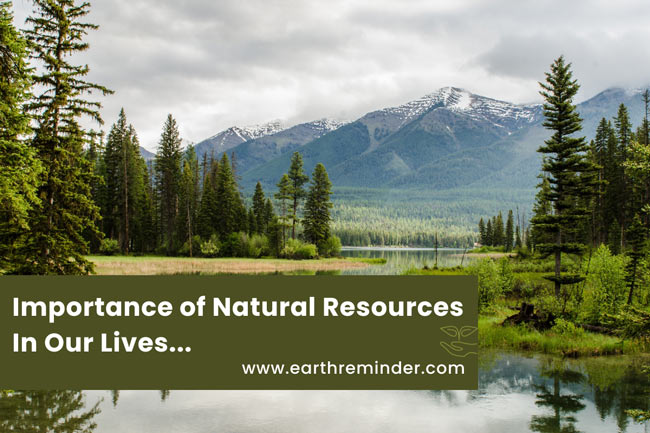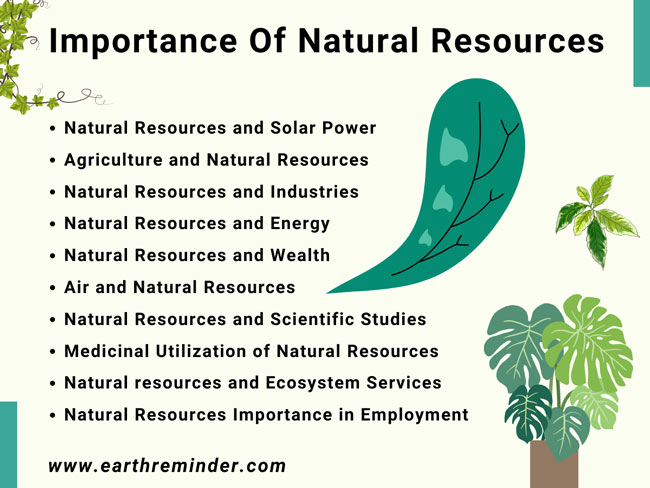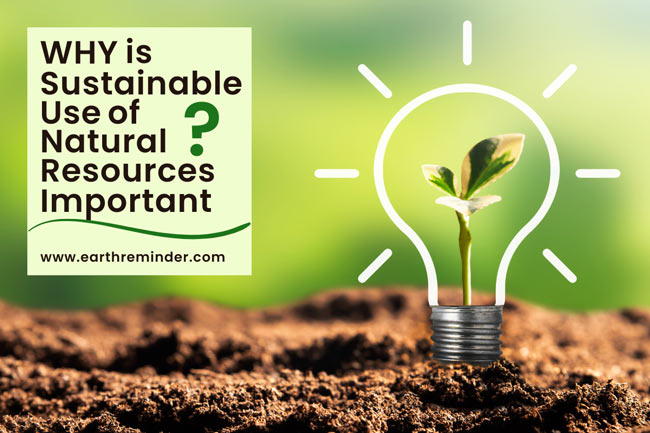Importance of Natural Resources In Our Lives
Natural resources play an important role in our lives. They are essential to the world’s economic, social and environmental well-being. We rely on natural resources for food, water, fuel, and much more. But beyond their daily utility, natural resources play a significant role in keeping the environment healthy and sustainable. This article will explore the importance of natural resources and their value in our lives.

Table of Contents
- 1 Introduction to Natural Resources
- 2 Importance of Natural Resources
- 2.1 Agriculture and Natural Resources
- 2.2 Natural Resources Importance in Employment
- 2.3 Natural Resources and Wealth
- 2.4 Natural Resources and Solar Power
- 2.5 Natural Resources and Air
- 2.6 Natural Resources and Energy
- 2.7 Natural Resources and Industries
- 2.8 Medicinal Utilization of Natural Resources
- 2.9 Natural Resources and Ecosystem Services
- 2.10 Natural Resources and Scientific Studies
- 3 Why Is Sustainable Use of Natural Resources Important?
- 4 Conclusion
Introduction to Natural Resources
Natural resources are substances on the planet used to sustain life and to meet human needs. Any natural product that people consume might be categorized as an organic substance. Resources such as stone, sand, metals, oil, coal, and natural gas can be considered natural resources. Even sunlight, air, water, soil, plants, animals, and birds are all examples of natural resources.
There is a connection between produced goods and natural resources. Despite not being natural resources, manufactured goods like plastics, metal sheets, electricity, textiles, concrete, and microchips are unquestionably produced from natural resources.
Essentially, we refer to these resources as “natural” because they are items that human society consumes but were made without human involvement. What constitutes a “resource” or a “natural” has changed over time and among different societies. Natural resources are materials and substances that occur naturally on Earth. Fossil fuels, for instance, took millions of years to form.
Importance of Natural Resources
The following are 10 reasons why natural resources are so important in our lives.

Agriculture and Natural Resources
Humans have utilized natural resources since they transitioned from a hunting and foraging lifestyle to one based on agriculture. In reality, agriculture cannot exist without natural resources. Plants, animals, trees, soil, water, fuel, energy, and a variety of other natural resources are all required for agriculture, as well as for building agricultural equipment.
The quality of natural resources is also important for agriculture. For example, agricultural land with poor soil quality or too much dryness will not yield as much as one with ideal conditions. This is why preserving and protecting natural resources is so crucial for the future of agriculture.
Due to farming’s strong dependence on natural resources, there has been a movement in recent years to make agriculture more sustainable. To accomplish this, less intensive farming practices can be used that do not deplete natural resources such as soil and plants.
Natural Resources Importance in Employment
There are several reasons why natural resources are important to employment.
Agriculture, manufacturing, and energy production all rely heavily on natural resources. The availability of natural resources directly affects employment in these sectors.
There are many industries that can benefit from the use of natural resources. For example, construction companies need sand, rock, and wood to build houses and roads, factories need minerals and metals to produce goods, and agricultural companies need land to plant crops.
Natural resources can also be tourism attractions, which support employment in the hospitality industry. For example, in the United States and Canada, people come from around the world to see Niagara Falls; this creates jobs for tour guides, hotel workers, and restaurant staff.
Responsibly managing natural resources can create employment through activities like conservation and reforestation. Moreover, recreational activities such as camping, hiking, and fishing depend on natural resources such as forests, lakes, and rivers.
Natural Resources and Wealth
Wealth comes not only in the form of money but also in the form of natural resources. The majority of nations’ “wealth” is made up of natural resources. They are extremely valuable resources.
A country rich in natural resources is effectively wealthy, as these resources can be converted into financial capital. Because emerging nations need more and more energy, countries with abundant natural resources, particularly non-renewable resources, see their worth increase.
Due to their diminishing supply and increased market demand, non-renewable natural resources now have a higher value. As a result, many nations rely on these resources to sustain their economies; This is evident because many of the world’s wealthiest countries also have abundant natural resources.
Natural Resources and Solar Power
Natural resources play an important role in solar power. Solar panels depend on sunlight to generate electricity; without the sun, there would be no solar power. The fact that solar energy is a renewable natural resource is a huge benefit. For another 5 billion years, an endless supply of sunlight will be available to us. A single hour of sunlight supplies enough electricity for every human on Earth for an entire year.
Natural Resources and Air
Air is one of the most important natural resources on Earth. Not only does it provide us with the oxygen we need to breathe, but it also influences our climate and weather. The air is made up of a mixture of gases, including nitrogen, oxygen, carbon dioxide, and also water vapor. It is a vital part of the water cycle and oxygen cycle. Without air, there would be no life on Earth. It is essential for all plants and animals to thrive. Even though we cannot see it or touch it, the air is one of the most important things in our world.
Natural Resources and Energy
The world today runs on energy. Natural resources such as wind, water, tides, geothermal heat, solar radiation, fossil fuels, petroleum, and many others are used to generate energy. It powers our homes, our businesses and industries, and our transportation. Fossil fuels like coal and oil have been the traditional sources of energy for centuries. But they’re not renewable, which means they’ll eventually run out.
Renewable energy sources like solar, wind, and hydro are becoming increasingly important as we look for ways to reduce pollution and build a more sustainable future. All energy sources have pros and cons, but it’s important to remember that we need all of them to keep the world running smoothly.
Natural Resources and Industries
Natural resources are important for industries because they provide the raw materials needed to produce products. Without these resources, industries would not be able to function.
For example, the oil and gas industry relies heavily on natural resources such as crude oil and natural gas. These materials are used to power vehicles and other machinery.
Other examples include the textile, power, and food industries. They use natural resources like minerals, plants, animals, solar radiation, hides and skins, natural fibers, and other raw materials to produce their products.
These resources are essential for industries that extract resources, such as forestry, fishing, and mining. Also, access to natural resources can be a significant factor in the location of industries. For example, many mining companies choose to set up operations in areas with large deposits of minerals or oil. This way, transport costs can be reduced, and raw materials can be more easily accessed. When industries can extract and process raw materials efficiently, they can produce more goods or services at lower costs.
Medicinal Utilization of Natural Resources
There can be no denying the importance of natural resources in medicine. Over 60% of the global population relies on plants for medicinal care, and herbs are used in both their raw and modified forms to treat illnesses and disorders. Many traditional medicines are made from plant extracts. Even today, a large number of modern medicines are derived from plants.
In addition, natural resources are also used to create medical devices and equipment. For instance, metals and minerals are used to make surgical instruments and other hospital equipment. Water is used in almost all medical procedures, from sterilization to hydration.
Natural Resources and Ecosystem Services
The importance of natural resources in the environment depends significantly on ecosystem services or the benefits humans gain from nature.
- Regulatory services refer to how ecosystems help to regulate the Earth’s systems, including climate, water cycle, etc.
- Provisioning services are the goods and resources we get from ecosystems, such as food, water, medicine, etc.
- Cultural services are the non-material benefits we gain from ecosystems, such as recreation and aesthetic enjoyment.
- Supporting services are the necessary functions that ecosystems provide for other services to be possible, such as pollination and decomposition.
Natural Resources and Scientific Studies
Numerous enthusiastic scientists have been and continue to be inspired by the presence of natural resources in the environment. This has led them to pursue additional research and create products that have benefited humanity and, subsequently, the entire world.
Many scientific studies would be impossible without natural resources. For example, we would not be able to test new medicines or develop breakthrough technologies without them.
Natural resources also play a vital role in environmental research. By studying how humans interact with natural resources, we can learn about the potential impacts of our activities on the Earth.
Also Read: What Are The Threats To Our Natural Resources?
Why Is Sustainable Use of Natural Resources Important?
There are several reasons why we should use natural resources sustainably.

- It ensures that these resources will be available for future generations. If we use them in an unsustainable way, our children will be left with a damaged and depleted planet.
- It can help to conserve biodiversity and protect the environment. We will eventually deplete all natural resources if we do not use them sustainably.
- Using natural resources sustainably can create jobs and boost the economy.
- It can help ensure that local communities have access to the necessary resources. For example, by ensuring people have access to clean water and sanitation, we can make their lives healthier.
There are several ways to use natural resources sustainably. For example, It is possible to use them in a manner that does not degrade the environment or damage it. Likewise, we can ensure that we use only what’s available and don’t exploit it so that everyone will have enough in the future. Also, we can reuse and recycle materials whenever possible.
The only way to guarantee that we can exist on this planet indefinitely is through using sustainable energy. The concept of sustainable energy is often thought of as something novel and innovative, but it has been around for ages. Initially, humans relied on renewable energy to survive; they gathered wood for fires and foraged for food.
Nowadays, people have more choices. Electricity can be produced using renewable energy sources. In our homes or places of business, we can also use low-tech solutions like solar panels or energy-efficient bulbs.
A sustainable energy approach involves more than just using less coal and fuel oil. Responsibly utilizing resources also means not endangering the environment or those who rely on it for their survival. Therefore, we need to use natural resources sustainably to keep our planet and species healthy over the long term.
Conclusion
In conclusion, natural resources play an important role in sustaining life. We rely on them for food, clothing, shelter, fuel for our homes and businesses, and medicines that keep us healthy. It is crucial to use them properly since they are finite resources that can be depleted if misused. Our resources will soon be exhausted if we continue to move in the same direction. We are responsible for actively conserving natural resources so that the next generation can enjoy the same benefits as we do today.